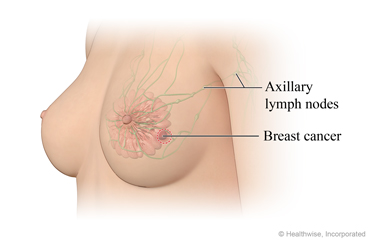
What is an axillary lymph node dissection?
Lymph nodes move and filter fluids between body tissues and the bloodstream. Because of this, cancer cells often spread to the lymph nodes. An axillary lymph node dissection is surgery to remove lymph nodes from under your arm.
This surgery is usually done during your lumpectomy or mastectomy. During this surgery, your doctor will remove lymph nodes that have cancer and those that cancer could easily spread to. This surgery reduces the chance that the cancer could come back. It also helps your doctor plan further treatment for you.
After the surgery, you may go home the same day. Or you may need to spend the night at the hospital. You will probably be able to go back to work or your normal routine in 3 to 6 weeks. This depends on the type of work you do and any other treatment you may need.
After your lymph nodes are removed, you will be at greater risk for swelling in your arm. This is called lymphedema. You will have to take good care of your affected arm. Your doctor or physical therapist will tell you what to look for. They will also teach you how to take care of your arm.
This surgery may be done at the same time as other breast surgeries. If this is the case, how you prepare may be different.
How do you prepare for surgery?
Surgery can be stressful. This information will help you understand what you can expect. And it will help you safely prepare for surgery.
 Preparing for surgery
Preparing for surgery
- Be sure you have someone to take you home. Anesthesia and pain medicine will make it unsafe for you to drive or get home on your own.
- Understand exactly what surgery is planned, along with the risks, benefits, and other options.
- If you take a medicine that prevents blood clots, your doctor may tell you to stop taking it before your surgery. Or your doctor may tell you to keep taking it. (These medicines include aspirin and other blood thinners.) Make sure that you understand exactly what your doctor wants you to do.
- Tell your doctor ALL the medicines, vitamins, supplements, and herbal remedies you take. Some may increase the risk of problems during your surgery. Your doctor will tell you if you should stop taking any of them before the surgery and how soon to do it.
- Make sure your doctor and the hospital have a copy of your advance directive. If you don't have one, you may want to prepare one. It lets others know your health care wishes. It's a good thing to have before any type of surgery or procedure.
What happens on the day of surgery?
-
Follow the instructions exactly about when to stop eating and drinking. If you don't, your surgery may be canceled. If your doctor told you to take your medicines on the day of surgery, take them with only a sip of water.
-
Take a bath or shower before you come in for your surgery. Do not apply lotions, perfumes, deodorants, or nail polish.
-
Do not shave the surgical site yourself.
-
Take off all jewelry and piercings. And take out contact lenses, if you wear them.
At the hospital or surgery center
-
Bring a picture ID.
-
The area for surgery is often marked to make sure there are no errors.
-
You will be kept comfortable and safe by your anesthesia provider. The anesthesia may make you sleep. Or it may just numb the area being worked on.
-
The surgery will take 1 to 2 hours.
-
You may have a drain in your underarm.
When should you call your doctor?
- You have questions or concerns.
- You don't understand how to prepare for your surgery.
- You become ill before the surgery (such as fever, flu, or a cold).
- You need to reschedule or have changed your mind about having the surgery.
Where can you learn more?
Go to http://www.healthwise.net/patientEd
Enter Z413 in the search box to learn more about "Axillary Lymph Node Dissection: Before Your Surgery".
Current as of: October 25, 2024
Author: Ignite Healthwise, LLC Staff
Clinical Review Board
All Healthwise education is reviewed by a team that includes physicians, nurses, advanced practitioners, registered dieticians, and other healthcare professionals.

